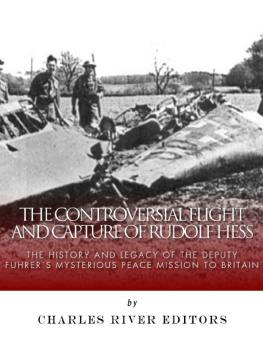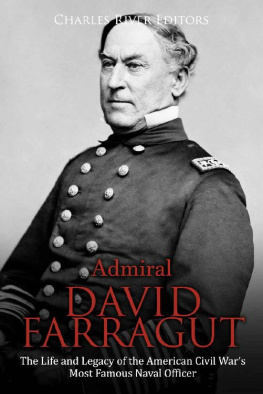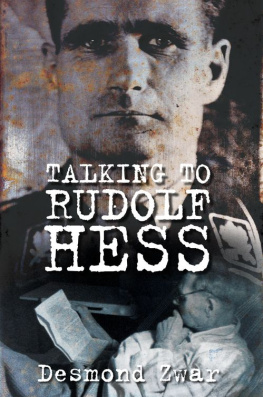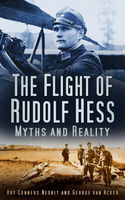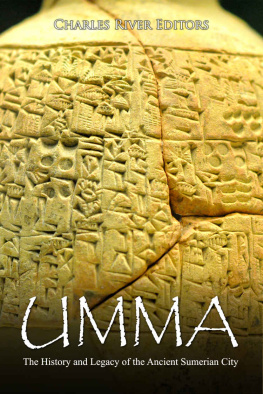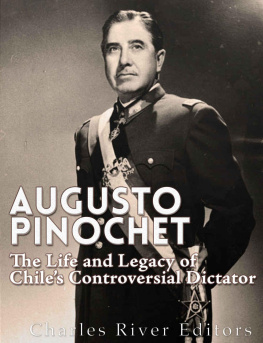Charles River Editors - The Controversial Flight and Capture of Rudolf Hess: The History and Legacy of the Deputy Fuhrer’s Mysterious Peace Mission to Britain
Here you can read online Charles River Editors - The Controversial Flight and Capture of Rudolf Hess: The History and Legacy of the Deputy Fuhrer’s Mysterious Peace Mission to Britain full text of the book (entire story) in english for free. Download pdf and epub, get meaning, cover and reviews about this ebook. year: 2015, publisher: Charles River Editors, genre: Non-fiction. Description of the work, (preface) as well as reviews are available. Best literature library LitArk.com created for fans of good reading and offers a wide selection of genres:
Romance novel
Science fiction
Adventure
Detective
Science
History
Home and family
Prose
Art
Politics
Computer
Non-fiction
Religion
Business
Children
Humor
Choose a favorite category and find really read worthwhile books. Enjoy immersion in the world of imagination, feel the emotions of the characters or learn something new for yourself, make an fascinating discovery.
- Book:The Controversial Flight and Capture of Rudolf Hess: The History and Legacy of the Deputy Fuhrer’s Mysterious Peace Mission to Britain
- Author:
- Publisher:Charles River Editors
- Genre:
- Year:2015
- Rating:3 / 5
- Favourites:Add to favourites
- Your mark:
- 60
- 1
- 2
- 3
- 4
- 5
The Controversial Flight and Capture of Rudolf Hess: The History and Legacy of the Deputy Fuhrer’s Mysterious Peace Mission to Britain: summary, description and annotation
We offer to read an annotation, description, summary or preface (depends on what the author of the book "The Controversial Flight and Capture of Rudolf Hess: The History and Legacy of the Deputy Fuhrer’s Mysterious Peace Mission to Britain" wrote himself). If you haven't found the necessary information about the book — write in the comments, we will try to find it.
Charles River Editors: author's other books
Who wrote The Controversial Flight and Capture of Rudolf Hess: The History and Legacy of the Deputy Fuhrer’s Mysterious Peace Mission to Britain? Find out the surname, the name of the author of the book and a list of all author's works by series.
The Controversial Flight and Capture of Rudolf Hess: The History and Legacy of the Deputy Fuhrer’s Mysterious Peace Mission to Britain — read online for free the complete book (whole text) full work
Below is the text of the book, divided by pages. System saving the place of the last page read, allows you to conveniently read the book "The Controversial Flight and Capture of Rudolf Hess: The History and Legacy of the Deputy Fuhrer’s Mysterious Peace Mission to Britain" online for free, without having to search again every time where you left off. Put a bookmark, and you can go to the page where you finished reading at any time.
Font size:
Interval:
Bookmark:
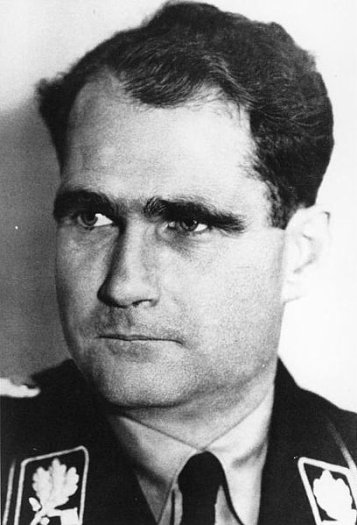
The Capture of Rudolf Hess (May 10, 1941)
Even if I could, I would not wish to expunge this time from my life. I am happy to know that I have done my duty toward my people, my duty as a German, as National Socialist, as loyal follower of my Fuehrer. I regret nothing. Rudolf Hess during the Nuremberg Trials
Stars glittered over the restlessly undulating waters of the North Sea late on the evening of May 10 th , 1941, as a lone twin-propeller Messerschmitt Bf 110 heavy fighter bearing the Iron Cross emblem of the Nazi Luftwaffe came in sight of the low, dark line of land along the horizon that marked where Scotland lay. Far to the south, waves of similar aircraft and Junkers JU 88 "fast bombers" were roaring through the fire-streaked skies over London, pounding the luckless metropolis with a heavy attack that killed over 3,000 British civilians in about an hour and setting the Houses of Parliament on fire. Given a clear view of their targets by the bright moonlight shining over the "Sceptered Isle," the German pilots created immense havoc in which at least one observer found a certain hellish beauty: The Anglo-Irish poet Louis MacNeice had arranged to spend the night in the dome of St. Paul's Cathedral. He wrote that soon after the raiders appeared, "great tawny clouds of smoke, rolling in sumptuous Baroque exuberance, had hidden the river completely and there we were on the dome, a Classical island in a more than Romantic Inferno. It was far and away the most astonishing spectacle I have ever seen. (Manchester, 2012, 350).
However, the solitary Messerschmitt 110 several hundred miles to the north was not on a combat mission. Instead, it bore extra 900-liter (237 gallon) fuel tanks greatly increasing its range designed for jettison using a control toggle in the cockpit and its principle payload was the man piloting the two-seat fighter alone. The man in the cockpit was Rudolf Hess, Deputy Fuhrer of Hitler's Third Reich, and he was on a mission to bring peace terms to the British. It is even possible he hoped to convince them to join with Hitler's Thousand-Year Reich in its great crusade against the Soviet Union, due to be launched in the very near future. Though he did not know it, he was actually on a forlorn journey into enemy territory, one that doomed him to a lifetime of solitary confinement in Spandau Prison before dying by his own hand as the last and loneliest of the Nazi overlords in 1987.
When Hess sat at the Me 110's controls in 1941, he was an individual with a bony face dominated by incredibly thick black eyebrows and a surprisingly mild-mannered expression for a man who was second in command to the world's most lethal tyrant. Outfitted in a fur-lined flight suit for warmth and carrying a bizarre kit of homeopathic remedies with him, the Deputy Fuhrer was soon to leap out of his aircraft, into the hands of the British and the pages of history alike, launching a thousand outlandish conspiracy theories with his actions.
Much, though by no means all, evidence suggests Hess' flight was not a practical plan carefully designed and mulled by the Nazi supreme command. Rather, it was likely a quixotic adventure conceived mostly in Hess' own mind and carried out with a strange sort of nave daring by Hitler's faithful secretary and biographer. It was also his desperate attempt to regain his master's trust and confidence. After all, Hitler's 'peace offensives' following the defeat of Poland and the fall of France had failed abysmally. It would have amounted to an unparalleled triumph had Hess succeeded where everyone else had failed. His zealotry had got the better of him. (Stafford, 2014, Introduction).
Thus, Hess was a man on a mission that ultimately was only important to him. The sheer lack of obvious practicality has been a touchstone for imaginative leaps of interpretation that range far beyond the realities of the situation. Hess did achieve something unique a wartime dictatorial leader voluntarily parachuting alone and unarmed into an enemy country with the intention of being captured. Hess seemed to have thought, though, that awe at his feat of aviation and what he believed implicitly was the self-evident truth of his message would be enough to immediately prompt the British to embrace Germany and the Fuhrer in friendship and alliance.
The plan was incredibly bold and daring, but it was also utterly useless. It was not for nothing that there was "a remark made in New York by Brenden Bracken who [] dismissed Hess as an 'overgrown Boy Scout'" (Stafford, 2014, Chapter 1). Amid all the dramatic incidents of the war, it remained one of the most remarkable yet most fruitless and empty. That said, the botched handling of the matter by the British (against the wiser council of the Prime Minister Winston Churchill) accidentally caused one tangible result of Hess' mission: confusing Stalin and the Soviets for a few crucial weeks and thus giving Hitler the chance to launch a preemptive invasion.
The Controversial Flight and Capture of Rudolf Hess: The History of Nazi Germanys Mysterious Peace Mission to Britain looks at one of the strangest events of World War II. Along with pictures and a bibliography, you will learn about Hess mission like never before, in no time at all.
Though extraordinary and even bizarre by the standards of other human personalities, Rudolf Hess' lone flight to England was a logical, almost inevitable continuation of the pattern of his life up to that point. The watershed experience of Germany's defeat in the First World War shaped future Deputy Fuhrer's fate, much like that of Hitler, Goering, Ernst Rhm, and practically every other Nazi official and general who had a hand in World War II, but several details unique to him supplied the final catalysts for the famous flight.
Hess was born into the family of a wealthy German businessman and his wife, Fritz Hess and Klara Munch, on April 26 th , 1894, in a suburb of Alexandria in the warm, exotic climes of Egypt. The adventurous Hess family established themselves there in 1865, nearly 30 years prior to Rudolf's birth as the eldest son and putative heir of the Hess fortune. A surviving photograph of Fritz Hess shows a man with a fleshy face, close-cropped hair, an upturned mustache, and a direct gaze from under eyebrows only slightly thinner than those of his famous son.
The Hess & Co. business was a successful export and trading firm that enabled the family to maintain two capacious villas, one in Alexandria and one in their native Bavaria. The Hesses went to Bavaria during most summers, enjoying a respite from the Egyptian heat in the scenic Fichtel Mountains. As it turned out, Bavaria proved to be the fertile breeding ground for Nazism's eventual emergence. The young Rudolf, however, had no idea of this future and instead savored the good life in a variety of picturesque surroundings: The desert stretched eastwards from the garden wall, while to the west was the fairy-tale city of Alexandria with its port, splendid buildings, and bazaars. To the north, a golden beach fringed the turquoise waters of the Mediterranean. (Nesbit, 2011, 16).
Hess was the oldest of three children and was fully expected to take over the family business when his father grew too old or died, but he showed no interest whatsoever in the firm despite being sent to a business school. His interests were mainly scientific and mathematical, and the day-to-day operation of a wholesale exporter held no charm for him, though he enjoyed its lucrative results immensely.
Instead, the formative event of the future Deputy Fuhrer of the Third Reich occurred in 1914 when war erupted across Europe. Destined to end two of Europe's most powerful surviving autocratic monarchies, the German Empire and the Russian Empire, and thrust the world firmly into the modern age, the Great War erupted thanks to a series of alliances which fell like a row of dominoes and brought every major European power into the conflict within a few days. The Germans invaded Serbia, preemptively declaring war on Russia when that nation mobilized in possible defense of the Serbs. France also mobilized but its government appeared uncertain what to do. The Germans decided the issue by demanding the French remain neutral and then almost immediately invading, attacking fully neutral Belgium on the way to secure its vital rail lines. Britain declared war on Germany in turn, launching the prolonged bloodbath.
Font size:
Interval:
Bookmark:
Similar books «The Controversial Flight and Capture of Rudolf Hess: The History and Legacy of the Deputy Fuhrer’s Mysterious Peace Mission to Britain»
Look at similar books to The Controversial Flight and Capture of Rudolf Hess: The History and Legacy of the Deputy Fuhrer’s Mysterious Peace Mission to Britain. We have selected literature similar in name and meaning in the hope of providing readers with more options to find new, interesting, not yet read works.
Discussion, reviews of the book The Controversial Flight and Capture of Rudolf Hess: The History and Legacy of the Deputy Fuhrer’s Mysterious Peace Mission to Britain and just readers' own opinions. Leave your comments, write what you think about the work, its meaning or the main characters. Specify what exactly you liked and what you didn't like, and why you think so.

